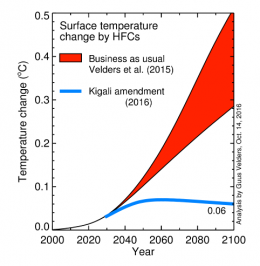Phasing out HFCs – A big win for our climate
19/10/2016

Last week’s news from Kigali, Rwanda, that hydrofluorocarbons (HFCs) emissions are being phased out globally is truly excellent news for our students and their successors. This single measure will remove up to 0.5°C warming at a time when global temperatures are more than 1°C above pre-industrial levels. In last December’s Paris Agreement, the world’s countries agreed a target maximum warning of 2°C or, if possible, 1.5°C. Without this phasing out of HFCs, agreed by nearly 200 countries as part of the Montreal Protocol , this would not be possible.
As an expert on ozone depletion, I was the lead author on the Chapter on Scenarios and Information for Policymakers in the 2014 WMO/UNEP Scientific Assessment on Ozone Depletion. It was this report that acted as scientific basis for the discussions in Kigali, and so I am delighted to see this action having been taken.

Source; Institute for Governance and Sustainable Development
The decision was reached in response to the Montreal Protocol on Ozone-Depleting Substances, whose goal is to protect the ozone layer, and represents a significant moment in the history of climate change talks and agreements.
Developed in the 1990s to replace ozone depleting substances, HFCs are powerful greenhouse gases and major contributors to global warming. Used mainly in air conditioners and refrigeration, they were listed among the seven greenhouse gases targeted by the UN Framework Convention on Climate Change.
Categories & Tags:
Leave a comment on this post:
You might also like…
Keren Tuv: My Cranfield experience studying Renewable Energy
Hello, my name is Keren, I am from London, UK, and I am studying Renewable Energy MSc. My journey to discovering Cranfield University began when I first decided to return to academia to pursue ...
3D Metal Manufacturing in space: A look into the future
David Rico Sierra, Research Fellow in Additive Manufacturing, was recently involved in an exciting project to manufacture parts using 3D printers in space. Here he reflects on his time working with Airbus in Toulouse… ...
A Legacy of Courage: From India to Britain, Three Generations Find Their Home
My story begins with my grandfather, who plucked up the courage to travel aboard at the age of 22 and start a new life in the UK. I don’t think he would have thought that ...
Cranfield to JLR: mastering mechatronics for a dream career
My name is Jerin Tom, and in 2023 I graduated from Cranfield with an MSc in Automotive Mechatronics. Originally from India, I've always been fascinated by the world of automobiles. Why Cranfield and the ...
Bringing the vision of advanced air mobility closer to reality
Experts at Cranfield University led by Professor Antonios Tsourdos, Head of the Autonomous and Cyber-Physical Systems Centre, are part of the Air Mobility Ecosystem Consortium (AMEC), which aims to demonstrate the commercial and operational ...
Using grey literature in your research: A short guide
As you research and write your thesis, you might come across, or be looking for, ‘grey literature’. This is quite simply material that is either unpublished, or published but not in a commercial form. Types ...






